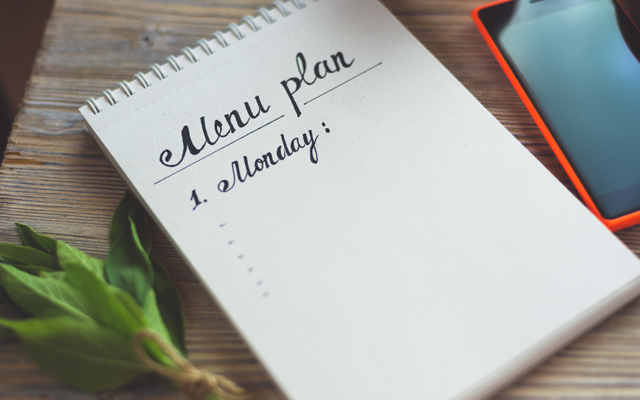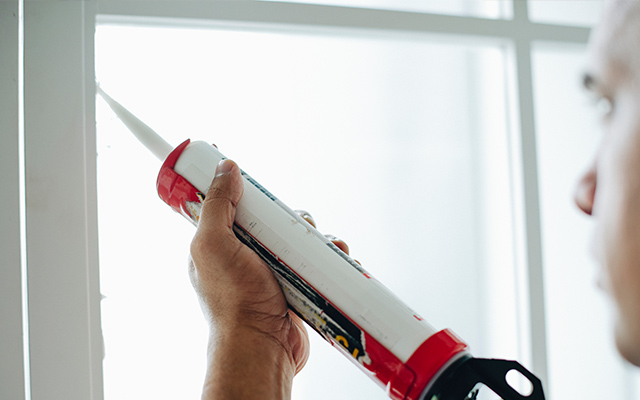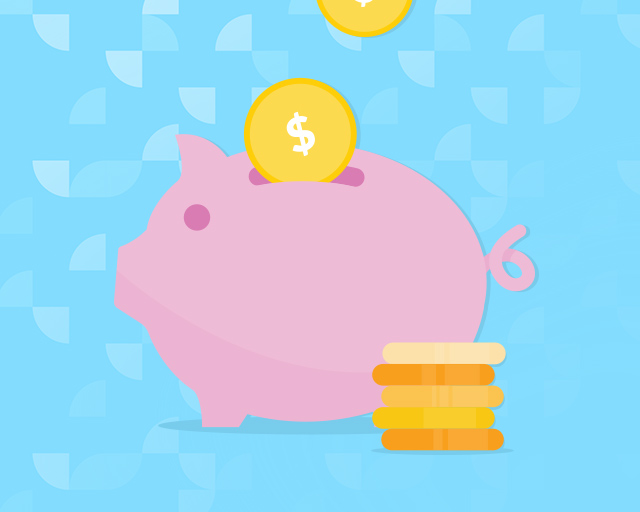

is inflation taking a bite out of your budget?
You may be hearing a lot about inflation on the news and social media, but where you may be feeling it is in your bank account.
We believe your finances are just as important as your credit, and the more you know about both can be helpful as you work toward a better financial future. That’s why we thought it’d be helpful to give you more info.
In this article we’ll be sharing:
› the 2 most common reasons for inflation
Inflation isn’t just when prices go up on one or two items. It’s when the overall cost of the goods and services you use most often in your everyday life – like food, gas, housing and utilities – cost you more than they did before.1, 2
How is inflation measured? Often with the Consumer Price Index (CPI) from the U.S. Bureau of Labor Statistics.3 The CPI shows the difference in overall prices from a recent month with the prices for that same month a year ago.
Inflation is usually shown as a percentage, but what does that percentage mean? It’s how much higher prices are now. As an example, the CPI for the end of April 2022 was 8.3%. That means that overall prices were 8.3% higher than last April.4 Wow!
- the cost of producing goods and services goes up
Companies and manufacturers who provide goods and services may be paying more for their own goods and services needed to operate, so they could be passing along the extra expense to their customers.5
- the demand for goods and services is greater than what’s available
Pandemic-related supply-chain issues mean some businesses can’t operate at full capacity. And that limits how much they can sell to consumers. Plus, there may be pent-up demand for some service industries, like restaurants and hotels, as more people look to eat out and travel again post-pandemic.5
In April, we conducted a survey with a group of over 300 Fingerhut customers. We asked how they’re feeling about inflation and what adjustments they’re making.
So, you can see that you’re not alone – 95% of customers just like you are feeling the pressures of inflation.6
How are they adjusting? Nearly all those surveyed have adjusted their spending to deal with inflation. Here’s how:
73% are cutting back on non-essential purchases
66% are buying less food (or cheaper brands) at the grocery store
65% are eating out less
59% are driving less to save gas
OK, you might be wondering, is there any good news? According to a TransUnion Consumer Pulse study released in March, most Americans (81%) reported that household income increased or stayed the same in the previous three months compared to just 19% who experienced a decrease. And 91% expect household income to stay the same or increase in the next 12 months.7
We want to you support you while you’re building or rebuilding your credit and working on your financial goals, so here are 6 tips that can help you lessen the sting of inflation.
1. update your budget
Why is this number one on our list? Because a budget is the best way to manage your money all year long, so it’s even more important when rising prices are affecting your finances.
If it’s been a while since you’ve looked at your budget, now’s a good time to go line by line and make updates and adjustments. Has your income changed? What about fixed monthly expenses like your rent or mortgage?
Next, look at variable expenses like food, gas, utilities, gas and entertainment. It may help to look at what you’ve spent the last couple of months for those variable categories to get a rough estimate to use.
What can you do if you don’t have a monthly budget? Start one right now. Don’t worry, it won’t take long to put together a simple one. In fact, you can learn everything you need to know in this budget article on our blog.
2. spend less if you can
Yeah, we know this is a tough one, but since the purchasing power of every dollar you spend is being crunched by inflation, it’s a good action to take. Here are a few mostly painless ways to spend less:

be a smart shopper
Look for sales and deals, buy in bulk wherever possible and shop store brands. Some stores have price-matching policies, so take advantage of those if you can. Check out your local dollar store to find necessities (and even toys for the kiddos) at good prices.

look for used or free items first
Your neighborhood website, social media sites and thrift stores are wonderful places to find gently used items at a fraction of new prices. On some sites, someone could even be giving away what you need for free – just to get it out of their house.

postpone big-ticket purchases
You may want a newer car, but unless it’s an absolute necessity, postpone buying one until there’s inflation relief in sight.
Food is what gives us the energy to do essential everyday activities things like work, go to school and be a parent, so it’s not always an easy area to make cuts.
And it doesn’t help that inflation is hitting food prices pretty hard. In fact, prices for food at home went up a whopping 10.8% between April 2021 and April 2022, That’s the largest 12-month percentage increase since November 1980.8
Here are some of our favorite ways to save on groceries:

buy more vegetables and fruit
Inflation on meat, poultry, fish and eggs was up 14.3% over April 2021, while vegetables and fruit was up 7.8%.4

create a meal plan each week
This can help you avoid impulse shopping or relying on takeout. Use your plan to make a shopping list and try going to the store on a full stomach to avoid impulse buys.9

hit the farmers markets
You can get great deals on all types of foods here, especially vegetables that are in season.

stock your freezer
Look for weekly sales on frozen veggies and meats, which can last longer than the fresh varieties.
4. eliminate unnecessary expenses
Remember your budget from the first tip? Go back and see if there are any expenses for services you’re not using, then decide if you want to cancel them, put them on hold or try to get a better deal on prices. Here are some examples:

gym memberships
Your gym may let you put your membership and monthly payments on hold. If so, replace your exercise routine with one you can do outside. Oh, and if you haven’t been to the gym in a long time, consider canceling it permanently.
Note: Check with your doctor before starting or changing any exercise routine.

magazine subscriptions
Remember that magazine you used to love but now the recent issues are stacking up unread? Cancel your subscription. Some magazines may even give you a small refund. Yes!

cell phone plans
You may be able to get a better monthly price by switching carriers. Before you do that, check to make sure that your phones will work on the potential carrier’s network. You can also check with your existing carrier to see if they have any better (or cheaper) plans that weren’t available the last time you changed your contract.

cable TV and streaming services
Get your family together and talk about what you watch and don’t watch, then cancel services that are just eating up your money every month. You can also try using a low-cost antenna for local channels.
5. reduce your home energy bill
Home energy costs can really add up during the coldest and hottest months of the year. Try these tips now and you may be surprised how much they can save you:

set your thermostat higher in the summer and lower in the winter
When the difference between indoor and outdoor temps is smaller, the lower your overall bill can be.10

turn off the lights
Longer days mean more sunlight, so keep your indoor lights off until you need them.

use fans to help with cooling and heating
Floor or ceiling fans can help circulate air through your house. During the summer, set ceiling fans to turn counterclockwise so they push cool air down.11 In the winter, reverse them so they’ll pull warm up.

change the filters in your heater or AC
Clean filters will help your system run more efficiently, which could mean lower energy costs.

use your curtains or blinds effectively
Blocking the sun can keep your house cooler in the summer and you’ll use your AC less. Letting the sun in during the winter may cut down on how often you use your heater.

seal cracks and openings around doors and windows
This will prevent warm air from leaking into your home in the summer and stop cold air from sneaking in during the winter.11
6. build an emergency fund if possible
Yes, it may seem impossible to do right now, but putting aside money from every paycheck toward an emergency fund can pay off in the long run. How? When unexpected expenses pop up – like car repairs or medical bills – your emergency cash can help you avoid using a credit card or loan to pay for them.
We hope this information – especially the tips – is helpful to you during this difficult time. We’ll be keeping an eye on inflation over the next few months and if we get any new info or tips, we’ll share them with you right away.
1 https://www.experian.com/blogs/ask-experian/what-is-inflation/
2 https://www.federalreserve.gov/faqs/economy_14419.htm
4 https://www.bls.gov/news.release/cpi.nr0.htm
6 Burns, G. (2022), Monthly Inflation Survey Results – April, Bluestem Brands: unpublished.
9 https://www.experian.com/blogs/ask-experian/how-to-save-money-now-to-fight-inflation/
10 https://www.energy.gov/energysaver/spring-and-summer-energy-saving-tips
11 https://www.energystar.gov/products/lighting_fans/ceiling_fans/installation_usage_tips


























